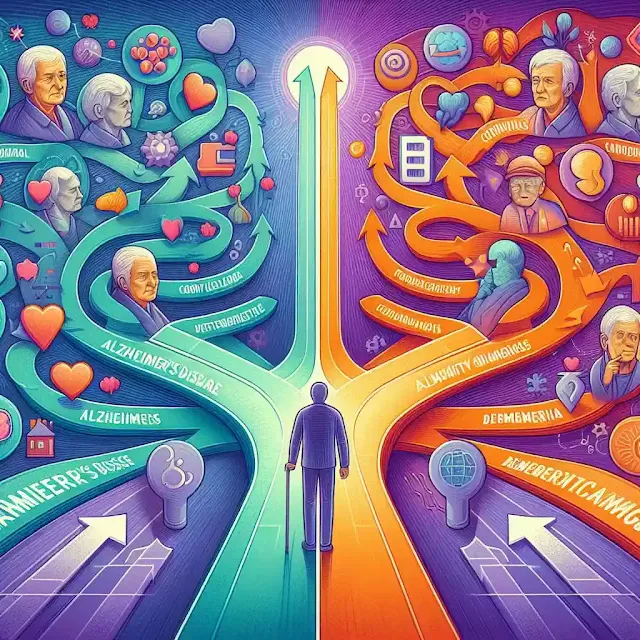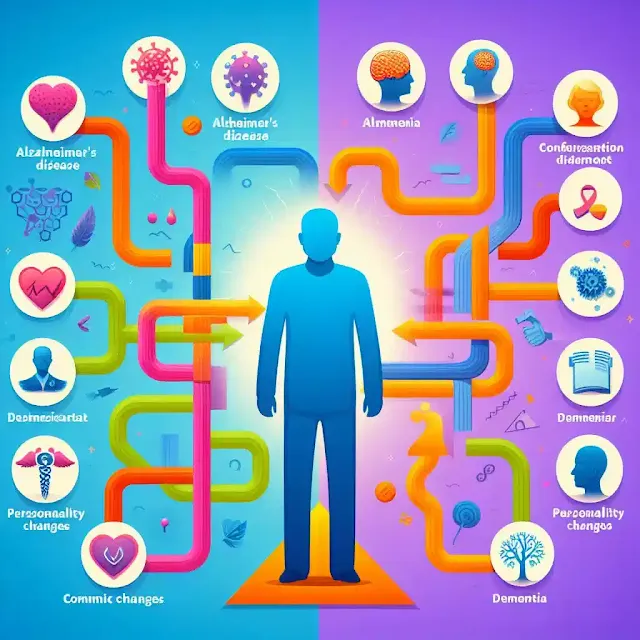Unveiling the Maze: Understanding Alzheimer's Disease and Dementia
Unveiling the Maze: Understanding Alzheimer's Disease and Dementia
Introduction
Memory lapses,
confusion, and personality changes – these can be unsettling signs that
something isn't quite right. Often, the terms Alzheimer's disease and Dementia
get thrown around interchangeably, causing confusion. But are they the same
thing?
This comprehensive
guide delves into the world of Alzheimer's and Dementia,
unpacking the key differences in symptoms, causes, and treatment options. We'll
equip you with the knowledge to navigate this complex terrain, offering
valuable resources and support along the way.
Foggy Memories and Lost Keys: Unveiling Alzheimer's Symptoms
Imagine forgetting the
name of a close friend or struggling to follow a simple recipe. These are just
some of the telltale signs of Alzheimer's disease, a progressive brain
disorder that affects millions worldwide.
The hallmark symptom
of Alzheimer's is memory loss. But it often starts subtly,
affecting recent memories first. People with Alzheimer's may:
·
Frequently misplace belongings and struggle to retrace their
steps.
·
Repeat questions or stories unknowingly.
·
Have difficulty remembering familiar places and faces.
·
Experience challenges with planning and problem-solving.
As the disease
progresses, other symptoms may emerge, including:
·
Language difficulties: Struggling to find the right words or hold a conversation.
·
Mood swings and behavior changes: Confusion, anxiety, and even aggression
can occur.
·
Loss of judgment and decision-making abilities: This can lead to safety concerns.
It's important to
remember that Alzheimer's affects everyone differently. The rate of
progression can vary significantly, and some symptoms may be more prominent
than others.
Demystifying Dementia: A Spectrum of Cognitive Decline
Dementia is a broad term used to describe a decline in
cognitive function that interferes with daily life. It's not a specific
disease, but rather a collection of symptoms caused by various underlying
conditions. Alzheimer's disease is actually the most common cause of Dementia,
accounting for roughly 60-80% of cases.
Here's the key
difference: Alzheimer's is a specific disease with a distinct pathology
in the brain, while Dementia is an umbrella term encompassing a range of
conditions causing cognitive decline.
Several other
conditions can also cause Dementia, including:
·
Vascular Dementia: Caused by impaired blood flow to the brain, leading to
problems with thinking and memory.
·
Lewy body Dementia: Characterized by abnormal protein deposits in the brain,
causing movement problems, hallucinations, and cognitive decline.
·
Frontotemporal Dementia: Affects specific lobes of the brain, leading to
personality changes, language difficulties, and problems with judgment.
Dementia symptoms can vary depending on the underlying cause.
However, some common signs include:
·
Memory loss, similar to Alzheimer's.
·
Difficulty with reasoning, planning, and problem-solving.
·
Challenges with language and communication.
·
Confusion and disorientation.
·
Personality changes and mood swings.
The Winding Paths: Differentiating Alzheimer's vs. Dementia
While both Alzheimer's
and Dementia involve cognitive decline, there are some key distinctions
to consider:
Focus of Impairment:
·
Alzheimer's: Primarily
affects memory and language in the early stages. Other cognitive functions
decline as the disease progresses.
·
Dementia: Can
manifest in various ways depending on the underlying cause. Memory loss may or
may not be the most prominent symptom.
Progression:
·
Alzheimer's: A
progressive disease with a gradual decline in cognitive abilities. The rate of
progression can vary, but it typically worsens over time.
·
Dementia: Progression
can be variable. Some forms, like vascular Dementia, may have a more
sudden onset or stepwise decline.
Underlying Cause:
·
Alzheimer's: Caused
by specific protein buildups in the brain (amyloid plaques and tau tangles).
·
Dementia: Has
multiple causes, including Alzheimer's disease, vascular problems, Lewy
bodies, and frontotemporal degeneration.
Diagnosis:
·
Alzheimer's: There's
no single definitive test, but diagnosis involves a combination of cognitive
assessments, brain imaging, and medical history review.
·
Dementia: Diagnosis
focuses on identifying the underlying cause through similar methods as for Alzheimer's.
Treatment:
·
Alzheimer's: There's
no cure, but medications can help manage symptoms and slow progression.
·
Dementia: Treatment
depends on the underlying cause. Some forms may have specific medications,
while others focus on managing symptoms.
It's crucial to
consult a doctor if you're experiencing any signs of cognitive decline. Early
diagnosis allows for proper management and support, improving quality of life
for both the individual and their caregivers.
Navigating the Maze: Alzheimer's Testing and Diagnosis
If you're concerned
about yourself or a loved one experiencing memory problems or cognitive
decline, seeking a diagnosis is the first step. While there's no single
definitive test for Alzheimer's disease, a comprehensive evaluation can
help identify the cause and develop a personalized care plan.
Here's what you can
expect during the diagnostic process:
Detailed Medical
History:
Your doctor will
review your medical history, including past illnesses, medications, and family
history of Dementia.
Cognitive Assessment:
A series of
standardized tests will be used to assess memory, thinking skills, language
abilities, and overall cognitive function.
Brain Imaging:
Imaging techniques
like CT scans or MRIs can help rule out other potential causes of cognitive
decline, such as strokes or tumors.
Blood Tests:
While not diagnostic
for Alzheimer's, blood tests can check for other conditions that may
mimic Dementia symptoms, like vitamin deficiencies or thyroid problems.
Genetic Testing:
In some cases, genetic
testing may be considered, particularly if there's a strong family history of Alzheimer's.
Lumbar Puncture:
Although not routinely
used, a lumbar puncture can analyze cerebrospinal fluid (CSF) for biomarkers
associated with Alzheimer's, such as amyloid-beta and tau proteins.
The Importance of
Early Diagnosis:
While Alzheimer's
is a progressive disease, early diagnosis offers several benefits:
·
Allows for earlier intervention and management of symptoms.
·
Provides the opportunity to participate in clinical trials for
new treatments.
·
Enables planning for future care needs and legal matters.
·
Offers emotional support and resources for both the individual
and their caregivers.
Seeking Solace: Treatment Options for Alzheimer's and Dementia
While there's
currently no cure for Alzheimer's disease or any form of Dementia,
there are treatment options available to manage symptoms and improve quality of
life. Here's a breakdown of the approaches for both conditions:
Alzheimer's Disease
Treatment:
·
Medications: Several
medications can help manage symptoms like memory loss, confusion, and
behavioral changes. These include cholinesterase inhibitors and memantine,
which work by influencing brain chemicals involved in memory and thinking.
·
Non-drug Therapies: Cognitive stimulation therapies, music therapy, and
physical activity can all play a role in maintaining cognitive function and
overall well-being.
·
Lifestyle Modifications: A healthy diet, regular exercise, and quality sleep are
crucial for managing Alzheimer's and promoting overall brain health.
Dementia Treatment:
·
Treatment for Dementia depends heavily on the underlying cause. For example,
vascular Dementia may benefit from medications that improve blood flow
to the brain.
·
General approaches similar to Alzheimer's, such as cognitive
stimulation therapies and lifestyle modifications, can also be helpful for
managing Dementia symptoms regardless of the cause.
The Role of
Caregivers:
Caregivers play a vital role in supporting individuals
with Alzheimer's or Dementia. They provide emotional support,
manage daily activities, and ensure the person's safety and well-being. Finding
support groups and resources for caregivers is essential to help them navigate
the challenges they face.
A Beacon of Hope: Research Advancements in Alzheimer's and Dementia
Alzheimer's disease and Dementia are complex
conditions with no easy solutions. However, ongoing research efforts offer a
glimmer of hope for the future. Here's a glimpse into some promising areas of
exploration:
·
Understanding the Underlying Causes: Scientists are delving deeper into the
biological mechanisms behind Alzheimer's and other Dementia-causing
conditions. This improved understanding can pave the way for the development of
more targeted therapies.
·
Early Detection and Diagnosis: Researchers are exploring new biomarkers and diagnostic tools
that could help identify Alzheimer's and other Dementias at
earlier stages, allowing for earlier intervention and potentially slowing
progression.
·
Novel Treatment Approaches: Research is underway on potential disease-modifying therapies
that could not only manage symptoms but also slow down or even prevent the
progression of Alzheimer's. This includes exploring drugs that target
amyloid plaques, tau tangles, and inflammation in the brain.
·
Lifestyle Interventions: The focus on the potential benefits of lifestyle modifications
like healthy diet, exercise, and cognitive stimulation continues to grow.
Researchers are investigating how these interventions might delay the onset or
slow the progression of cognitive decline.
·
Gene Therapy: While still in its early stages, gene therapy holds promise for
potentially modifying genes linked to an increased risk of Alzheimer's.
This approach is a long way off from clinical use, but it represents a
fascinating avenue for future exploration.
The Path Forward:
While there's still
much to learn about Alzheimer's and Dementia, ongoing research
offers a beacon of hope. By supporting research initiatives and participating
in clinical trials, we can all contribute to finding a cure for these
devastating diseases.
Living with Alzheimer's and Dementia: Support and Resources
Alzheimer's disease and Dementia can be
overwhelming for both the individual diagnosed and their loved ones. However,
numerous resources and support systems are available to help navigate this
journey. Here are some key resources to consider:
·
Alzheimer's Association: This leading organization provides a wealth of
information, support groups, and educational resources for individuals with Alzheimer's,
their caregivers, and the general public. You can find their website at https://www.alz.org/.
·
National Institute on Aging (NIA): Part of the National Institutes of
Health, the NIA offers extensive information on Alzheimer's and Dementia
research, clinical trials, and caregiving resources. Visit their website
at https://www.nia.nih.gov/health/alzheimers-and-Dementia.
·
Support Groups: Connecting with others facing similar challenges can be
invaluable. Support groups offer a safe space to share experiences, ask
questions, and find emotional support. Local Alzheimer's associations
and community centers often host support groups.
·
Caregiver Resources: Caregiving for someone with Alzheimer's or Dementia
can be demanding. Resources like respite care services, educational programs,
and online communities can provide much-needed support for caregivers.
·
Financial and Legal Planning: Early planning regarding finances, healthcare directives,
and power of attorney can ease the burden on families later. Consulting with an
elder law attorney can be beneficial.
Remember: You are not alone. With the help of available
resources and a strong support network, you can navigate the challenges of Alzheimer's
and Dementia and ensure the best possible quality of life for yourself
or your loved one.
Summary
Alzheimer's disease and Dementia are complex
conditions that rob individuals of their cognitive abilities. While there's
currently no cure, early diagnosis and a combination of treatment approaches
can help manage symptoms and improve quality of life. Ongoing research offers
promising avenues for future breakthroughs. By working together, we can create
a brighter future for those living with Alzheimer's and Dementia.
Frequently Asked Questions (FAQs)
Q: Is there a
difference between Alzheimer's disease and Dementia?
A: Yes, Alzheimer's
is a specific disease, while Dementia is an umbrella term encompassing a
range of conditions causing cognitive decline. Alzheimer's is the most
common cause of Dementia.
Q: What are the early
warning signs of Alzheimer's?
A: Early signs can be
subtle and may include forgetfulness, difficulty remembering recent events,
misplacing belongings, and challenges with familiar tasks.
Q: Is there a test for
Alzheimer's?
A: There's no single
definitive test, but a comprehensive evaluation involving cognitive
assessments, brain imaging, and medical history review can aid in diagnosis.
Q: What are the treatment
options for Alzheimer's?
A: While there's no
cure, medications, non-drug therapies, and lifestyle modifications can help
manage symptoms and improve quality of life.
Q: Where can I find
more information and support for Alzheimer's and Dementia?
A: Numerous resources
are available, including the Alzheimer's Association, National Institute
on Aging, and local support groups.



